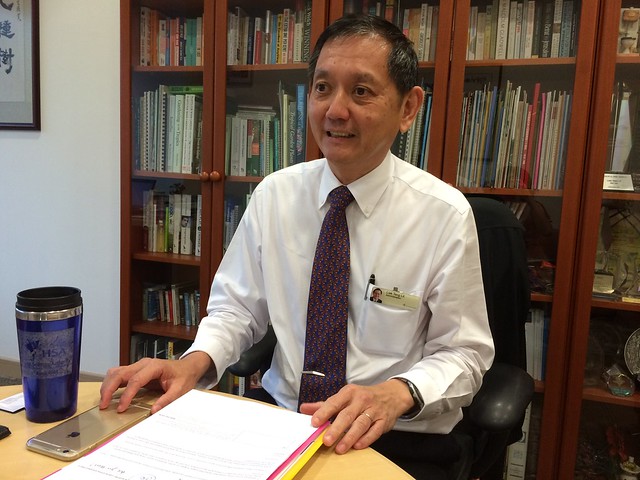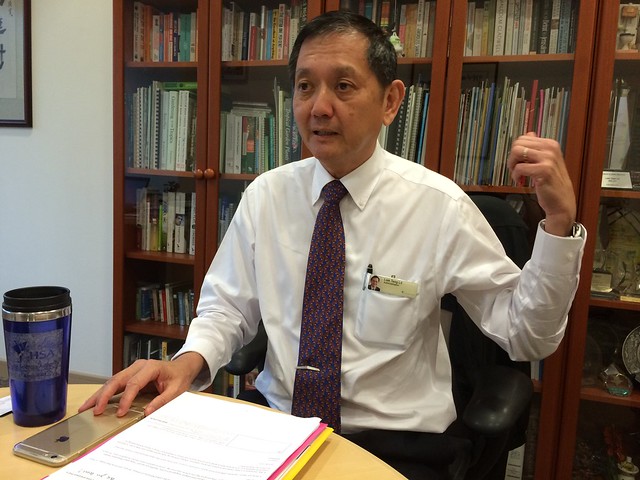
Imagine this: A future where highly-precise robots and not surgeons – stitch up patients in the operating theatre; brick-and-mortar stores finally losing the battle to e-commerce; and computers taking over the jobs of financial analysts.
A report by Business Insider Singapore, published earlier in May, warns that experts predict that robots will take over 30 per cent of our jobs by 2025 – many of these jobs being currently held by professionals, managers and executives (PMEs).
On top of having to cope with competition from technology, Singapore also has to contend with the cons of globalisation and grapple with an ageing population, said Mr Liak Teng Lit, group chief executive officer of Alexandra Health System.
“The world is changing. Jobs are disappearing and new jobs are being created. It’s going to become tougher and tougher to stay relevant,” he said in an exclusive interview with Alvinology.com.
In the context of economic development and fertility rates, the current Singapore is just like Japan two decades ago, said Mr Liak. But all is not doom and gloom if Singaporeans can embrace the inevitable sea-change by changing our mindsets and taking action to address challenges.
The first thing, he said, is to internalise the mantra “No one owes me a living” – be it on the national level, individual scale or company. He intoned: “We earn a living when we are useful. The day we become not useful is the day no-one can keep Singapore alive. So, going forward, what is it that we are going to do for the rest of the world which will help us make a living?”

And, with that realisation, Singaporean PMEs and companies need to find ways to upgrade themselves to maintain a competitive edge over others, he urged. Quoting Charles Handy, he said that the idea of “lifelong employment” needs adjustment – think work “assignments” lasting three to five years instead. To prepare oneself for the workforce, and to prepare for the next “assignment”, one cannot merely look towards doing paid work; a PME should be ready to do “homework” – which is to keep deepening one’s knowledge and acquiring new skills; as well as do unpaid charity work. “The likelihood of you getting your next assignment comes from doing charity, because that’s where you build up trust,” he said.
Citing the success of Japanese automobile company Toyota, Mr Liak said that it would do each company good to examine how every employee can be involved in making everyday improvements to productivity and workflow, as well as radical improvements on a larger scale. At Khoo Teck Phuat Hospital, for example, more than 50 quality control teams from each department look at how to eliminate problems and streamline workflow, the Toyota way. The hospital aims to shorten the current average length of stay for patients from 5.5 days to 4.5 days, he shared. “We are trying to shorten the time required for diagnosis, and perform follow-up treatments from home,” he said.
And instead of viewing technology as a competitor, Mr Liak suggests that workers become more tech-savvy for their own benefit. This is just one of the ways one can become more future-ready – NTUC has initiatives like the U Associate programme and the Future Leaders series to help PMEs better prepare themselves for the future.
In conclusion, Mr Liak urged: “Singapore would not be what it is today without NTUC. Law and order in settling disputes is absolutely necessary for Singapore. We have been so lucky, and we have had leaders with good acumen and vision. But luck can run out. Singaporeans must learn, unlearn and relearn to stay competitive.”








![[Review] ASICS Sportsyle's Iconic Gel-Lyte III OG gets an eco-friendly rework - here are two sneakers that care for the planet [Review] ASICS Sportsyle's Iconic Gel-Lyte III OG gets an eco-friendly rework - here are two sneakers that care for the planet - Alvinology](https://media.alvinology.com/uploads/2021/07/asics-og-shoes-01-1024x576.jpg)

